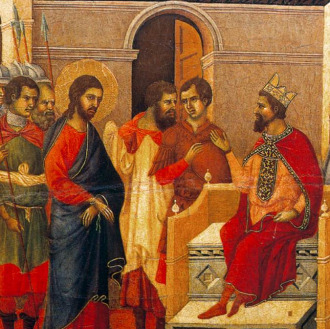Early Church Testimony
The early church writer Justin Martyr (lived c. 100 to 165 A.D.) challenged his readers to look up the records of the Romans about certain details concerning the life of Jesus.
According to Adam Clarke's Commentary, Justin gave his first apology (defense of) Christians and Christianity to the Romans and their senate around 150 A.D. In particular, Justin is quoted as stating the following about Jesus.
"Now, there is a village in the land of the Jews, thirty-five stadia from Jerusalem, in which Jesus Christ was born, as you can ascertain also from the registers of the taxing made under Cyrenius, your first (Roman) procurator in Judea."
Rome and the Crucifixion
Concerning the crucifixion itself, Justin wrote, in his First Apology recorded around 150, that the details surrounding the event could be ascertained by an official report written by Pontius Pilate. Pilate was the official overseer or Prefect of the Romans, over Judea, from 26 to 36 A.D.
"And the expression, 'They pierced my hands and my feet,' was used in reference to the nails of the cross which were fixed in His hands and feet.
"And after He was crucified, they (Roman soldiers) cast lots upon His vesture, and they that crucified Him parted it among them. And that these things did happen you can ascertain in the Acts of Pontius Pilate" (The Historical Jesus: Ancient Evidence for the Life of Christ).

Justin, later in his Apology, discusses several of Jesus' miracles and asserts that they, too, were recorded by Pilate in official reports. We can safely assume that if Justin (along with Tertullian, who lived c. 155 to 240 A.D., and others) challenged their readers regarding the written records of the Romans related to Christ that they were not bluffing.
A Hostile World
Justin, Tertullian and others lived in an environment that was still very hostile to Christianity. Christians did not gain the Roman Empire's official toleration for their beliefs until Constantine's Edict of Milan in 313 A.D. Although these men may not have always been right doctrinally, they were certainly not out and out liars.
In the Reign of Claudius
A Roman historian named Gaius Suetonius Tranquillas, who was the chief secretary of Emperor Hadrian and who had access to the imperial records, mentions Jesus in a section he wrote concerning the reign of Emperor Claudius. He refers to Christ using the variant spelling of "Chrestus."
"Because the Jews at Rome caused continuous disturbances at the instigation of Chrestus, he (Claudius) expelled them from the city" (ibid., chapter entitled "Ancient Historians").
Missing Records
It should be noted that most records written by the Romans, of any kind, have long since perished, especially if they were recorded on papyrus, vellum, or other materials that are easily perishable.
Not only did the records of the Romans fade from existence due to age, some were destroyed in the chaos caused by barbarian invasions starting in the third century and by the military excursions of the Vikings and Magyars in medieval Europe. Even monasteries, which were often the only significant places that housed any handwritten manuscripts, were often torched by pagan barbarians during a raid.
The Nazareth Stone
There exists at least one confirmed written record by the ancient Romans that links the city of Nazareth (the hometown of Jesus) to an official edict. The Nazareth stone, found in the city in 1878 A.D. and dated to about 41 A.D., records Caesar's imperial decision that those in the city should not disturb the graves of the dead and threatens punishment to those who do!